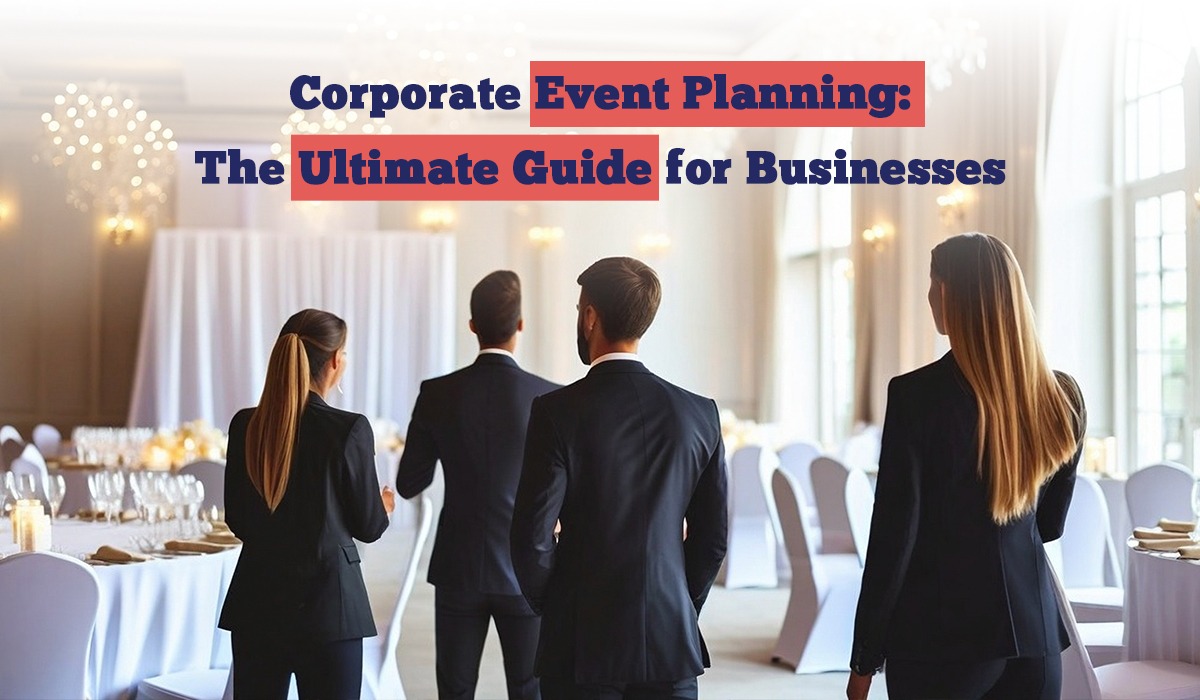Corporate events offer exciting business opportunities to connect, motivate, and flourish. These events help enhance teamwork, build long-lasting relationships in the business world, and enable you to leave a lasting impression on your employees and customers.
However, the planning and execution of corporate event planning can be overwhelming, which is why it can be helpful to have a detailed guideline to follow so you’re always ahead of the planning process and don’t miss out on any key details. Many organisations choose to hire event planning businesses to outsource event management. However, if that’s not your deal, we’ve got your back! Whether you’re about to host a product launch, a conference, or an awards ceremony, we are here to help you through every part of corporate event management.
Let’s explore the world of corporate events through our ultimate guide so you can host the corporate event of the year:
What is a Corporate Event?
A corporate event is any gathering sponsored by an organisation to achieve its business goals. These events may focus on the company’s employees or customers. There are several types of corporate events. Most common examples of corporate events include:
Conferences
Conferences are usually held to educate or motivate a target audience. They also provide opportunities to build networks and collaborate with attendees. These events are typically held at hostels or conference centres and include a keynote speaker and several other speaking sessions on relevant educational topics.
Product Launches
Product launches are company events to introduce or showcase a new product or service. They focus on informing the media or the target audience about the product or service being launched, its prototype, or any other relevant details about the business and what it’s launching.
Trade Shows & Exhibitions
Trade shows and exhibitions primarily connect companies to their target audiences and customers. These events also enable customers to strengthen their relationships with existing customers and learn about new industry developments. They can also be an excellent source to generate brand awareness and make new sales during the shows.
Corporate Parties and Get-togethers
Corporate parties and galas can be formal or semi-formal events, such as a small corporate party or a big, extravagant gala. These types of events are usually organised to celebrate events and boost employee morale. They include award ceremonies, holiday parties, charity galas, and company anniversaries.
Annual General Meeting (AGM)
An Annual General Meeting is a corporate event where an organisation’s shareholders, board members, and executives gather to review the organisation’s financial performance, discuss future business goals, and make key business decisions through voting. These meetings are set up in conference halls or corporate offices.
Team-Building Events
Team building events focus on enhancing teamwork dynamics, improving the overall work culture, and enhancing employee communication and collaboration. Team building events can include outdoor activities, teamwork retreats, workshops, and training sessions.
Why Corporate Event Planning Matters?
Corporate event planning is a significant aspect of running a business—whether a small business or a large one. Every organisation needs to plan and execute events to foster employee morale, strengthen customer relationships, generate leads, and convert them into sales. Corporate events can also help businesses enhance their brand reputation and get ahead of their customers when learning about industry developments and advancements.
Create Meaningful Brand Experiences
Whether it’s a trade show, a product launch, an annual general meeting, or a team-building event, corporate events contribute greatly to an organisation’s success by building meaningful experiences that align with the company’s business goals. Moreover, every organisation needs to take the initiative to enhance employee morale and improve teamwork while simultaneously working towards employee satisfaction and retention. Corporate events that focus on celebrating and motivating employees can be a significant way to achieve this goal. When employees feel valued and connected, job satisfaction and productivity also increase, contributing to a company’s success.
Networking and Building Connections
Corporate planners can also help achieve the objective of engaging clients and fostering networking. Whether your company is hosting trade shows, charity galas, or an award ceremony, corporate event planners organise and manage events for organisations. From planning and logistics to execution, every step of the party-planning process is handled efficiently and professionally. An organisation must note that a well-organised event enhances a company’s professional image and builds a brand reputation.
Launch Products / Brands
Moreover, corporate event management services can also be essential to host product launches and other promotional events for seamless branding and execution. Professional event management services ensure the theme, equipment, and logistics align effectively with the message the organisation is trying to send out and that the message engages and sticks with the target audience through planning and creativity.
Reputation Management
Besides logistics, corporate event planning helps a company maintain and establish its reputation in the relevant market. Poorly organised events can harm a company’s credibility and disappoint customers and clients. Thorough planning, coordination, and execution with attention to detail are necessary to host a successful corporate event.
In conclusion, corporate event planning is a strategic business tool. Businesses can use these events to their advantage by leveraging expert corporate event planners and event planning services to drive engagement and build brand awareness.
Steps for Successful Corporate Event Management
Successful corporate event planning involves a series of curated steps that help businesses organise events that leave an imprint on attendees while enabling entities to achieve their business objectives.
Here’s our detailed guide to successful corporate event management:
Step 1: Defining Event Objectives
The key to organising any grand event is a well-set-out objective. Even the most thought-out events fail to make a statement without a clear direction. Here’s how to set an objective for your corporate events. Start by answering the following questions:
- What is the purpose of this event?
- Who is the audience?
- What do you expect the event to achieve?
Set SMART Objectives
Setting SMART objectives (specific, measurable, achievable, relevant, and time-bound) can also ensure clarity and effective planning.
Other elements you may want to plan out include the stage of your buyer’s journey, especially if you’re planning a sales or marketing event. It’s significant to identify what stage of buyers you intend to target.
Note: Choose the Right Event Type
Another essential element of corporate event planning includes ensuring you’re choosing the right kind of event. For instance, plan a product launch if you aim to create brand awareness or generate buzz for your new product or service. However, if your goal is to work towards team-building, choose team-building events such as parties, retreats, or workshops and training sessions. This helps an organisation align the purpose of the event with its business strategy.
Lastly, remember that identifying a clear objective for an event is relatively straightforward as long as you communicate well with the leadership and other teams to set out precise business growth objectives.
Step 2: Budget and Resource Allocation
An event budget outline is necessary to estimate all the costs associated with an event a business can expect to incur. It’s a financial blueprint for your corporate event company. Budget and resource allocation can help guide the company through costs related to venue hire, catering services, entertainment, and other event-related costs.
An effective budget plan estimates small- and large-scale costs. From napkins to venue hiring. Budget allocation should be flexible enough to accommodate any last-minute changes that may end up costing extra and also robust enough to cover all the facets of the event, from initial planning to post-event activities and risk management that will be required throughout the event management process. When starting with budget and resource allocation, start by answering the following questions:
- What is the purpose of the event?
- Who is the target audience?
- What outcomes do you expect the event to achieve?
Other elements to consider include:
- The Essentials: Itemise potential expenses and classify them into essential elements of the event. For instance, think of the main ingredients that will set the tone for the event first and foremost. These include venue, catering, entertainment, and tech. However, garnishing is also equally important in the corporate world of event planning. So, also plan out your budget for marketing and staff salaries.
- Pricing: Estimate every event-related cost diligently. You want to ensure you don’t compromise on quality while searching for the cheapest available option. Source multiple quotes to ensure competitive pricing and accuracy instead of accepting the first number presented to you.
- Allocation of funds: Allocate funds strategically. Give the highest priority to event segments that contribute the most to your objectives. Whether it’s a dazzling venue or the marketing that should create a buzz, highlight whatever is important and fund it to the best of your ability.
- A safety net: A contingency fund is a well-known phenomenon in the business world, and it only makes sense for it to accompany your corporate event planning. Set aside 5 to 10% of your overall budget for the “just in case” moments to tackle any challenges head-on.
Step 3: Venue Selection & Logistics
Choosing the right venue is significant to an event’s success. There are several factors to be considered when you choose a corporate event. For instance, accessibility. If the event venue isn’t accessible to most of the target audience, they’re likely to end up skipping the event altogether. However, if your event is located at a central location with good public transport facilities, guests will be more likely to attend.
Factors to consider for an event venue:
- Capacity & Layout: Ensure the venue is able to accommodate the expected number of attendees.
- Location: Whether local or international, the location for the event needs to be convenient and easily accessible to the attendees. It’s recommended to choose a central location with nearby public transport, parking facilities, and hotels and restaurants nearby to accommodate out-of-town visitors.
- Technologies & other amenities: Check for Wi-Fi, on-site tech support, wheelchair accessibility, and catering options.
- Customisation: Choose a venue that can customise the venue according to the theme of your choice and allow for branding adjustments.
Once you have narrowed down the venues, put in extra effort and choose to visit the venues in person to get a better insight into the venue and check whether it meets your business objectives. Check the lighting, space, and tech equipment and see if it aligns with the theme you’re planning to incorporate into your event.
Step 4: Renting Corporate Event Equipment and Decorations
When planning a corporate event, one of the most significant choices you will face is whether to rent or buy the event equipment. From tables and seating to lighting and audio-visual equipment, the choices you make can impact the budget, logistics, and event experience for attendees. Renting event equipment has been becoming an increasingly popular choice. There are several companies that provide complete corporate event rental solutions in the UK.
Advantages of Renting Equipment and Decorations
Cost-Effective
One of the biggest advantages of renting out event equipment rather than purchasing it is the cost-effectiveness associated with the choice. By choosing to rent event equipment, you save yourself upfront investments in décor items such as tables, seats, and props. Purchasing items can be expensive, especially if you factor in the cost of high-quality items. Sacrificing the quality of items that are crucial to the events’ layout is also not a wise choice.
Get High-quality Equipment and Décor
Renting enables you to allocate a budget more effectively and provides you access to high-quality and trendy equipment without spending a fortune. The rental fee is often a fraction of the original price, enabling you to reallocate your budget to other equally important parts of the event, such as entertainment, décor, and catering.
No Storage & Transportation Costs
Additionally, with purchasing equipment comes the need to store and transport the equipment. That is where your corporate event management company steps in—the event business will offer delivery and pick-up services, giving you the hassle and cost of transporting the equipment back and forth. After the event, you also won’t have to worry about arranging storage to store the bulky equipment, as the rental company will collect the equipment from the venue.
Corporate Event Equipment Rental Checklist
Here’s a corporate event planning checklist to ensure you host a seamless and successful corporate event:
1. Audio-Visual Equipment
High-quality AV equipment is essential for engaging presentations, imparting clear communication, and providing an overall immersive event experience.
Microphones will also be required for panel discussions, speeches, and any Q&As at the end of the event. Handheld mics are ideal for speakers who prefer to move around the stage while presenting. However, lapel mics are usually the go-to for corporate events, as they do a decent job of masking background noise. This microphone is also an affordable option for events of any size or goal.
Speakers and PA are other necessary AV equipment to improve the guest experience. These pieces ensure sound is distributed evenly over the room, preventing audio dropouts.
Projectors and screens are needed to display presentations, slides, or videos. If you’re hosting a casual event in an outdoor setting or an employee retreat at an outdoor location, consider renting an LED screen for better visuals.
You can also rent DJ booths and speakers for corporate parties that are casual and laid-back and let the employees have fun by dancing and letting the work stress evaporate.
2. Lighting
Lighting and staging are the life of your party. These two elements set the tone for the event, and enhance the ambience and visibility. A well-designed stage should include a podium or risers for speakers to stand behind so that they’re visible to the guests without any difficulties. A podium should preferably be combined with a microphone for a professional setting.
Another aspect to carefully consider is the stage lighting. Stage lighting is one element that will place the focus of the event on the speakers and what they have to say. There are several types of lighting options to include in corporate event planning. For instance:
- Spotlights: help highlight key individuals or stars of the event (speakers or recipients of awards).
- LED: LED lights enhance the venue’s
- Moving head lighting and gobos: moving head lighting & gobos add a dynamic visual element and highlight products (during product launches), logos, and brand names.
Corporate event lighting rental for gala dinners and award nights, conferences, product launches, and other corporate events can be an excellent option to consider as a cost-effective option.
Tip:
- Always conduct a lighting and sound check before the event to ensure everything is working perfectly and avoid last-minute technical issues.
3. Furniture
Furniture that complements the theme and is comfortable for the guests is an essential element for the event’s success. There are several types of furniture to use depending on the corporate event you’re hosting:
- Presentation & Seminars: conference-style seating with rows of chairs facing the stage is the ideal option for an event where a speaker is likely to speak to the audience.
- Networking events: consider modern lounge rental furniture for networking events. For instance, high cocktail tables with lounge seating create a relaxed and casual atmosphere where guests can easily interact.
- Formal Events: Trestle tables with Chiavari chairs are the most popular option for formal events due to the elegant and luxurious ambiance they exude.
- Conferences: Office-style furniture rental for corporate seminars is lightweight and cost-effective. For instance, tam stools combined with bistro tables can be used for conferences.
Other furniture items that may prove necessary for a professional event include:
Easels
Easels provide a professional and easy way to communicate important details at an event. They can be used for:
- Welcome boards: Display event schedules, directions to the main venue, and display sponsor names.
- Displays & Presentations: Product launches, speaker intros, or company initiatives
- Sponsors & Branding: Use easels to display sponsor names or partners
Stanchion Posts
Stanchion posts can be highly useful for large-scale events as they help control crowd influx and ensure the orderly flow of guests. They can be especially useful for:
- Queue management: place entries for registration lines or food stations
- Restriction to areas: use to restrict entry to VIP areas, staff-only zones, or speaker room
- Photo booths: can be used to create designated areas for photo booths and engagement spaces.
Coat Rails
Coat rails should be placed at corporate events, particularly during colder seasons or formal events where guests may have bags, overcoats, or jackets. Consider placing them near the entrance along with staff to give numbered tickets for coats to enhance guests’ comfort and a professional atmosphere.
4. Catering Equipment
Excellent catering is expected at corporate events. So, stocking up on catering supplies is important. For smooth service, high-quality careering equipment will be required to ensure service remains smooth.
Think buffet stations with chafing dishes and food warmers help ensure food is at the right temperature through the duration of the event. They’re especially necessary for events that may run long, such as conferences or annual general meetings. Glassware, tableware, and utensils depend on the type of event. Consider disposable cutlery if the event is casual.
However, for a formal setting, high-quality dinnerware is preferred. If drinks are being served, a bar set up with ice buckets, cocktail stations, and relevant glassware matching drink types’ will be required. Corporate bar hire for networking events and bar parties is a trendy option for business parties.
5. Themed Décor
Consider event décor as the heart of the event—chosen décor will not only enhance ambience but also reinforce branding. Stylish backdrops and prop rentals for company events are easily available and also cost-effective. Luxury draping and curtain rental for corporate events is highly popular. Consider black and white drapes, as they add the perfect touch to a professional setting for formal or casual events.
White Art Deco or Red Curtain backdrops can be ideal for corporate events, as they maintain formality along with providing an elegant and simplistic setting for media coverage and photo opportunities. Table centrepieces with themed décor add a refined touch to dining tables and networking areas.
However, a specific theme can also be picked for the event, and relevant décor matching the theme can be a great way to provide an exciting and engaging experience to the guests. Guests can also be requested to wear costumes that align with the theme. Popular theme options for corporate events include garden parties for employee retreats, black and white for formal events, and rustic boho for networking events.
Tip:
- Incorporate branded elements like custom backdrops, logo projections, or themed décor to create a cohesive and memorable experience for guests.
Corporate Event Production & Technology
Technology is vital to improving communication, engaging people at higher levels, and ensuring efficient management during corporate events. 90% of corporate event management companies agree that rightly integrating technology in corporate events enhances the overall event experience for guests.
Some significant elements of corporate event production include audio-visual (AV) technology. Incorporating the right AV equipment ensures clear, high-quality sounds are heard without disturbances, while visuals such as projectors, LED screens, and video walls ensure presentations are easily visible to the guests. Stage designs are also crucial as they provide a focal point for speakers or panel discussions and ensure visibility to the audience.
Strategic lighting, backdrops, and digital displays also enhance the brand image and reinforce the brand’s message.
Mobile apps for event networking and scheduling are also an all-time hit. Say goodbye to paper schedules and incorporate all-in-one event apps into event planning. Event apps have revolutionised the way attendees navigate corporate events. They provide real-time updates, personalised agendas, and interactive maps, making event logistics easy and simple.
Event Marketing & Promotions
Marketing and promotions need to be done strategically to ensure an event is a success. The right strategies can drive attendance, enhance brand promotion, and help achieve business objectives.
Strategies for attracting attendees include:
- Email marketing
- Social Media Marketing
- Publish public press releases
- Partnerships & Sponsors
Branding corporate events is a cornerstone that builds attendees’ and shareholders’ perception about a brand. A strong branding strategy designed professionally builds credibility and boosts engagement along with post-event success.
Managing Attendees & Guest Experience
There is plenty that needs to be done to ensure a corporate event is a success, including creating an experience that delivers real value for attendees. Start off by getting rid of uninspiring, clunky, and generic registration forms. Instead, deliver a personalised experience that attendees will remember. With the right event business, turn registration into an experience and invest in customised, fully branded, and beautiful forms that are also easy to navigate.
Having the correct attendee data is also crucial to crafting tailored agendas. This can make it easy to recommend relevant sessions and create networking opportunities. This can also be critical for estimating the ROI (an essential element for corporate event planning). To enhance attendees’ experience, keep them engaged and excited. Radio silence after registration is complete and invites have been sent out usually doesn’t create the right buzz for an event. Keep guests excited to look forward to the event by sending out personalised emails or text messages.
Segment the attendees based on job type. For instance, send updates or reminders about data-focused sessions to registrars or guests in engineering, IT, or analytics. On-site engagement strategies can also be incorporated. Offer smart check-ins by using QR codes or facial entry, games and challenges for entertainment, or interactive polls & Q&As to encourage communication and live feedback.
Measuring Success & ROI
Measuring the success and return on investment (ROI) of a corporate event is significant to understanding its impact, justifying expenditures, and improving attendees’ experience for any future events. Consider evaluating key performance indicators (KPIs) and feedback collection.
The following KPIs are crucial to estimate whether the event made the noise it was anticipated to:
1. Attendance & Engagement Metrics
- Number of registrations vs. actual attendees
- Session participation number
2. Brand Awareness & Media Reach
- Media and press coverage
- Impression and new followers on social media
- Website before, during, and after the event
3. Revenue & Sponsorship Performance
- Ticket revenue earned
- Leads, leads, sales conversions
Post-event analysis and feedback collection are another way to measure event success and guest experience and help improve any drawbacks the event may have had for future events.
For post-event analysis and feedback collection, consider:
- Attendee feedback surveys: send personalised surveys via emails or event applications.
- Speaker & sponsor feedback: collect feedback from speaker and sponsors on engagement level and attendance.
- Sales & lead analysis: track the number of leads that converted to sales and use CRM data to analyse conversions
Choosing the Right Corporate Event Planner
Organising any type of corporate event requires meticulous planning and execution. The right corporate planner can make or break the event as they’re largely responsible for ensuring a seamless and smooth guest experience. But with so many options in the market, how do you pick the right one?
Here are some qualities to look for in a corporate event planner:
- Experience: An experienced corporate event planner with a track record of organising corporate events with the same size and goals as yours is essential. Expertise in managing logistics and crisis management is also crucial for a smooth experience.
- Creativity and portfolio: fresh and innovative ideas can go a long way in ensuring your event stands out. Gauge a planner’s creativity by analysing their event portfolio.
- Budget management: A good event planner will minimise expenditures without compromising the quality of the event. Discuss the budget and resource allocation for the event in advance.
- Strong Vendor Network: established planners have connections with reliable vendors. From caterers to AV specialists. This can save you time and money.
Another dilemma corporate organisations find themselves engaged in when hosting a corporate event is deciding whether to choose corporate event organisers or in-house event planning.
With the extent of planning that goes into executing successful corporate events along with the less room for error it allows, it is recommended to choose corporate event organisers to ensure a seamless and smooth event.
Corporate Event Organisers vs. In-house Planning
Here is why corporate event organisers are preferred to in-house planning:
- Expertise & Resources: Corporate event planners specialise in organising small-scale and large-scale events. They know how to leverage their industry knowledge and networks. In-house teams may lack this crucial element of corporate event execution.
- Time & Efficiency: Planning a corporate event requires a significant investment of time that is spent away from managing day-to-day business operations. Corporate event organisers streamline the process by managing the logistics and execution while you handle business operations.
- Cost-effectiveness: Cost-effectiveness: While corporate event planners may come with a fee, they also have the ability to secure efficient vendor deals. This makes the total cost affordable as opposed to in-house teams’ expenses.
How to Pick the Right Corporate Event Rental Company
There are several corporate event rental companies in the UK that provide affordable, trendy, and high-quality rentals with affordable pricing options. If you’re looking for corporate event rental companies around the UK, you’re likely to come across a wide variety of options.
Here is how to pick the right corporate event rental company:
1. Availability of Equipment
Since rental companies are in high demand, they may not always have the required equipment available. Therefore, before committing to a rental company, confirm the availability of the relevant equipment on the required date. Reliable vendors such as Danial Lay Event Services in London, Kent, and Surrey provide high-quality rental essentials, from décor and furniture to AV equipment.
2. Pricing & Cost Transparency
Make sure to compare rental costs from different event organisers. It’s not wise to go for the cheapest option, as you may risk equipment quality. Consider opting for a company with competitive pricing with no hidden fee. Enquire about pick-up, delivery, and set-up costs before commitment.
3. Customer Support & Service Quality
There is little to no room for error when organising a corporate event. Therefore, choosing an event management company that has excellent service quality and is known for its customer support is significant. Choose a rental company that provides on-site support and emergency troubleshooting to manage any last-minute technical support.
4. Reliability & Brand Reputation
Check for customer reviews and testimonials online before committing. A reliable rental company should have a proven track record for punctuality, equipment quality, and customer service.
Common Mistakes When Renting Corporate Event Equipment and How to Avoid Them
Many businesses end up making critical mistakes when renting corporate event equipment, leading to last-minute event disruptions. Here are common mistakes made by businesses when renting corporate equipment and how to avoid them:
1. Delivery Delays & Last-Minute Setbacks
Late deliveries of essential equipment such as furniture, staging, and lighting can disrupt the event schedule. To avoid such mishaps, book an appointment well in advance, especially during peak seasons. Moreover, don’t forget to confirm delivery and set up times a week before the event.
2. Not Checking Equipment Comparability
Many organisers assume all equipment will work smoothly with the venue’s infrastructure. However, that isn’t always the case. Mismatches, such as incompatible sound systems or power supplies, can occur, leading to last-minute issues.
To avoid such disruptions, conduct a venue visit with your rental provider to test compatibility or opt for a rental company that provides tech support and help with installation.
3. Overlooking Hidden Costs
Rental companies sometimes include additional fees for delivery, set-up, installation, and pick-up costs. These costs can often be overlooked by businesses. Make sure to discuss these costs in advance and request a detailed quote that includes all potential charges. Also enquire about overtime policies in case the event runs longer than anticipated.
Conclusion
Organising a corporate event can be overwhelming. However, through careful coordination, planning, and the right equipment, you can ensure the event’s success. From selecting the right event management company to renting high-quality equipment, every detail contributes to delivering a memorable experience for attendees and creating a buzz in the market.
A well-organised corporate event where guests are engaged and comfortable not only enhances brand reputation but can also leave a lasting impact on a business’s stakeholders.
FAQs
What is corporate event management?
Corporate event management includes the planning, organising, and executing of several business-related events. These are several types of corporate events. These include product launches, conferences, seminars, ornate galas, and more.
How much does it cost to plan a corporate event?
The cost of planning a corporate event depends upon the venue, equipment, catering, entertainment, and event planning services. Professional planners typically charge 10% to 15% of the total event budget, while experienced planners may set their minimum fee at £5,000 to £10,000.
However, this does not include expenses such as marketing, promotion, transportation, and contingency funds.
What do corporate event organisers do?
An event business will manage the setup and aesthetics of the corporate event. They are also responsible for arranging equipment such as AV equipment and the décor for the event. They may also organise entertainment prospects for the event.
Where to rent event equipment for corporate events?
There are various options to rent equipment for corporate events. However, for businesses based in London, Kent, and Surrey, Daniel Lay Event Services can be a reliable rental company to consider.
How do I start an event planning business?
Starting an event planning business requires having a business strategy, creative ideas, and strong management skills. Start off by developing a business idea and creating a business plan, followed by registering the business, building a brand and online presence, and building vendor relationships.
 Retro
Retro








